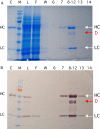Cost-effective production of a vaginal protein microbicide to prevent HIV transmission
- PMID: 18316741
- PMCID: PMC2268773
- DOI: 10.1073/pnas.0708841104
Cost-effective production of a vaginal protein microbicide to prevent HIV transmission
Abstract
A series of small-molecule microbicides has been developed for vaginal delivery to prevent heterosexual HIV transmission, but results from human clinical trials have been disappointing. Protein-based microbicides, such as HIV-specific monoclonal antibodies, have been considered as an alternative approach. Despite their promising safety profile and efficacy, the major drawback of such molecules is the economy of large-scale production in mammalian cells, the current system of choice. Here, we show that an alternative biomanufacturing platform is now available for one of the most promising anti-HIV antibodies (2G12). Our data show that the HIV-neutralization capability of the antibody is equal to or superior to that of the same antibody produced in CHO cells. We conclude that this protein production system may provide a means to achieve microbicide ingredient manufacture at costs that would allow product introduction and manufacture in the developing world.
Conflict of interest statement
The author declares no conflict of interest.
Figures


References
-
- WHO/UNAIDS. AIDS Epidemic Update: Special Report on HIV/AIDS, December 2006. Geneva: UN/WHO; 2006.
-
- Poignard P, Saphire EO, Parren PW, Burton DR. Annu Rev Immunol. 2001;19:253–274. - PubMed
-
- Burton DR, Pyati J, Koduri R, Sharp SJ, Thornton GB, Parren PW, Sawyer LS, Hendry RM, Dunlop N, Nara PL, et al. Science. 1994;266:1024–1027. - PubMed
Publication types
MeSH terms
Substances
LinkOut - more resources
Full Text Sources
Other Literature Sources
Medical

